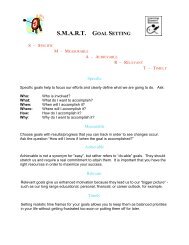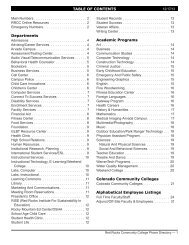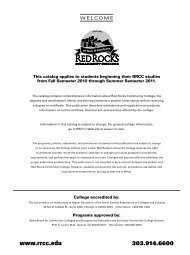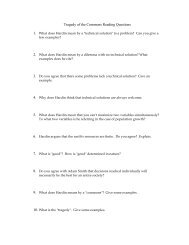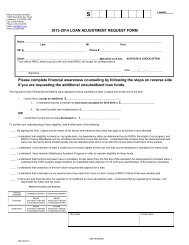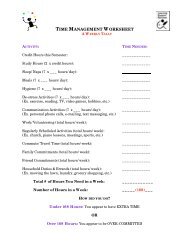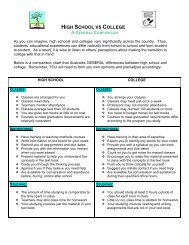opportunities, options, excellence - Red Rocks Community College
opportunities, options, excellence - Red Rocks Community College
opportunities, options, excellence - Red Rocks Community College
You also want an ePaper? Increase the reach of your titles
YUMPU automatically turns print PDFs into web optimized ePapers that Google loves.
Academic Standards<br />
Academic Integrity<br />
At <strong>Red</strong> <strong>Rocks</strong>, academic integrity is the ethical<br />
foundation upon which the academic<br />
community pursues professional, administrative<br />
and scholarly endeavors. Everyone<br />
associated with the college’s academic community<br />
has a responsibility for establishing,<br />
maintaining and fostering understanding and<br />
respect for academic integrity. Following are<br />
some principles associated with academic<br />
integrity to which we expect students to<br />
adhere:<br />
• Assume responsibility and take credit<br />
only for the words and/or ideas in an academic<br />
exercise that are expressly one’s own.<br />
• Use information, computer programs,<br />
disks, another student’s work, study aids,<br />
and/or other materials only when allowed<br />
by the instructor.<br />
• Remove materials from the library,<br />
labs, and other college facilities only<br />
when an official representative of the college<br />
grants permission.<br />
• Use copyrighted materials only with<br />
permission.<br />
• Refuse to help another commit an act of<br />
academic dishonesty.<br />
Academic dishonesty is the intentional act<br />
of fraud when an individual claims credit<br />
for the work of another, uses unauthorized<br />
materials, or fabricates information in any<br />
scholarly exercise. Academic dishonesty<br />
also includes, but is not limited to, forging<br />
educational documents, damaging or<br />
destroying the works of another, or assisting<br />
others in acts of academic deception. If you<br />
are aware of an incident of academic dishonesty,<br />
please report the occurrence to a<br />
faculty member, department chair or administrator.<br />
Those committing academic dishonesty<br />
will be subject to disciplinary action:<br />
failing the assignment or course, and/or<br />
being expelled from the college.<br />
Attendance<br />
To get the most benefit from your instruction,<br />
you should attend each class, come to<br />
class prepared, arrive on time, hand in<br />
assignments when due, and take exams<br />
when scheduled. In addition, you need to<br />
comply with attendance policies set by individual<br />
instructors.<br />
Course Load<br />
For most students, a typical academic<br />
course requires two hours of outside preparation<br />
for each hour spent in class. For<br />
example: A 15 semester credit load represents<br />
a commitment of 45 hours per week—<br />
consisting of 15 hours in class and 30 hours<br />
of outside preparation.<br />
The average full-time course load is 15<br />
semester credits for each fall and spring<br />
semester. During the summer semester, the<br />
average full-time course load is 12 semester<br />
credits. Students registering for fewer than<br />
12 credits are classified as part-time. You<br />
need written permission from your advisor<br />
to enroll for more than 20 credits during any<br />
semester.<br />
Evaluation and Grading<br />
The evaluation of your achievement or mastery<br />
is based upon learning objectives.<br />
Achievement means successfully reaching a<br />
specified level of knowledge or understanding.<br />
Mastery means successfully reaching a<br />
level of competency in a skill. Your final<br />
course grades are assigned at the end of<br />
each semester for classes taken during that<br />
semester. If you need an earlier grade report,<br />
contact the instructor before the end of the<br />
course and request an “early release of a<br />
grade” letter. This letter is unofficial.<br />
Grades<br />
To review or obtain a copy of your grades:<br />
1. Call the S.T.A.R. phone system at<br />
303.572.STAR(303.572.7827), and press<br />
“2” for grades. Enter your student identification<br />
number (normally your Social Security<br />
number) and personal access code (your<br />
birth month and birth day e.g. 0423).<br />
2. Use the World Wide Web.Log on to<br />
www.rrcc.edu and follow the prompts to the<br />
online enrollment system. After you enter<br />
the CCCWEB area, enter your student identification<br />
number and access number as<br />
described above.<br />
Grading Symbols:<br />
Grade<br />
A<br />
B<br />
C<br />
D<br />
F<br />
Description<br />
Distinguished achievement<br />
for superior work<br />
Better than acceptable<br />
achievement<br />
Acceptable achievement for<br />
advancement in the same or<br />
related studies<br />
Less than acceptable achievement<br />
for advancement in the<br />
same or related studies<br />
(credit may not transfer)<br />
Failed to achieve or master<br />
the learning objectives of the<br />
course. A grade of “F” does<br />
not apply toward certificates or<br />
degrees.<br />
Additional Grading<br />
Symbols:<br />
(AU) Audit.If you want to take a course<br />
without earning semester credit, you can<br />
register to audit that course. You must pay<br />
tuition and fees for the course and declare<br />
your intention to audit no later than the<br />
course’s tuition refund date. Once you have<br />
registered to audit a course, you cannot<br />
change your registration from auditing to<br />
earning semester credit for the course. The<br />
college will not award semester credit for<br />
any audited course.<br />
(AW) Administrative Withdrawal. The<br />
grade of AW may be given at the discretion<br />
of the individual faculty member.<br />
(W) Withdrawal.Through Admissions,<br />
you have officially withdrawn from the<br />
course or the college by the approved date<br />
and time.<br />
(CR) Credit.You have achieved the learning<br />
objectives for the course with a grade of<br />
C (or better). The instructor for that course<br />
evaluates your achievement on a credit/nocredit<br />
basis. The CR symbol is limited to<br />
specific courses designated by certain disciplines.<br />
(NC) No-Credit.You have not achieved the<br />
learning objectives for the course with a<br />
minimum grade of C. The instructor for that<br />
course evaluates your achievement on a<br />
credit/no-credit basis. The symbol is limited<br />
to specific courses designated by certain dis-<br />
<strong>opportunities</strong>, <strong>options</strong>, <strong>excellence</strong> 18



